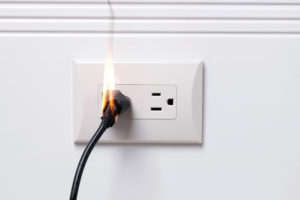For my October post I’m going to discuss dangerous electrical issues that you need to be aware of in your home.
If your lights flicker when you turn on an appliance with a high wattage, it could be because the voltage in your home is fluctuating too much. If the flickering lasts longer than the use of the appliance, this could be a symptom of a more serious electrical problem. Other signs that the voltage isn’t right in your home include lights that dim unexpectedly or frequently burn out. Loose wiring is the most serious reason for flickering lights and a main cause of house fires.
If you have a circuit breaker that tripped, it could be due to an overloaded circuit, a short circuit or the breaker itself is faulty and needs to be replaced.
A backstabbed receptacle is one where wires are stripped and extra electrical connections are added to holes in the back of the receptacle. These connections can become loose through time and also don’t have as much surface contact area as wires that have been wrapped around the side screws and connected with screw connectors. A backstabbed connection could overheat and cause serious electrical damage.
If a wall switch is making buzzing, sizzling, popping or crackling sounds when you turn it on and off, it is probably defective or worn out. The switch contacts are arcing inside which can lead to burnt contacts and heating of the switch and wiring connected to it. Turn the circuit breaker to the off position and call an electrician as this situation could start a fire.
A ground fault circuit interrupter (GFCI), also known as a ground fault interrupter (GFI), is an electrical outlet that’s placed in areas where water sources are present such as kitchens and bathrooms or in areas where moisture accumulates such as swimming pools, laundry areas, basements, garages and all exterior receptacles. GFCI’s protect you from receiving an electric shock by detecting the slightest difference in current leaving from and returning to the circuit. If the leaving current and the returning current aren’t the same, the GFCI senses the difference and in less than one tenth of a second it will trip or shut off the circuit.
A double tapped breaker is when two conductors (wires) are connected to one circuit breaker screw. It can cause loose connections, arcing, overheating and is a potential fire hazard.
Most CO (carbon monoxide) detectors lose their effectiveness after five years and smoke/photoelectric alarms may stop working after ten years. It’s important to replace your smoke alarm batteries every year. Moisture, humidity, heat and cold can shorten a battery’s life, regardless of their use-by date. Don’t put your family or home at risk by not purchasing new batteries.
If you lose power in part of your home, take a look at your electrical panel. If you smell a burning odor, see smoke, hear popping sounds, or a circuit breaker continually trips when you reset it, call an electrician immediately.
NEVER attempt to do any electrical work yourself as you could receive an electric shock or get electrocuted.
ALWAYS hire a licensed electrician to diagnose and repair any electrical issues that you’re experiencing at your home or office.
Call WattsControl, Inc. at 508-309-6631 if you’re experiencing any of the above situations or for any electrical needs that you have.

